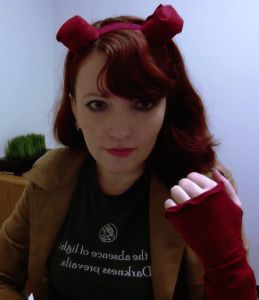This post comes with a couple of caveats: the first is that I am not, by using specific examples, trying to say that any book I mention here is bad. When I am trying to say that, I will leave you in no doubt.
The second is that the title probably doesn’t mean what you think it means: there’s been a lot in the media lately about the perils (if any) of liking things that are problematic in terms of, say, race, gender treatment, violence, etc. But this isn’t about that. This is living-room stuff.
1. The Masochist Read
Three things I find unnerving: frogs, eyeballs, the end of the world.
One thing I love: Hellboy comics, in which characters I adore are basically wallowing 24/7 in the entire list above.
These are the books you keep going back to and it sort of torments you, not necessarily because of the kind of problematic material I mentioned above but because, strictly considered, reading them is not you. You don’t read the book where they kill the dog for a cheap scare. You don’t read the romance where it’s A-OK for the heroine to end up with someone who appears to be an alcoholic. You don’t read the techno-thriller with details so transparently flimsy you start mentally adding scare-quotes to the narrative. Except you do.
2. That Series Book You Hate
The very first Terry Pratchett novel I ever read was Small Gods. My least favorite Pratchett book: also Small Gods. In theory, one of the marvelous things about the Discworld novels is that the world of the series is big enough for readers to only follow the characters they want to, but try telling that to Me Circa 1994–2004, who just couldn’t bring herself to stick the book in the Goodwill bag. For series readers, completism can be like a sickness, and you end up giving shelf space/device memory to things you’ll never read again.
3. Discreet Dalliances
Now more than ever, e-books have made it possible to hide away the books you don’t want anyone to see you reading: the pop-lit, the young-adult books, the steamy romances, the improbable thrillers with equally improbable heroes. (15 days till the next Pendergast novel comes out, but don’t say I’m the one who told you). In some ways, this one is the opposite of number 2 above, in that shame is causing you to not use bookshelf space. Wouldn’t want anybody seeing that you have Roger Moore’s autobiography, would we?
What are the books you have complicated relationships with?
Next time: A seasonal meditation on two-movies-on-1-DVDs…because I have no non-horror two-movies-on-1-DVDs.
Blow this case wide open:

